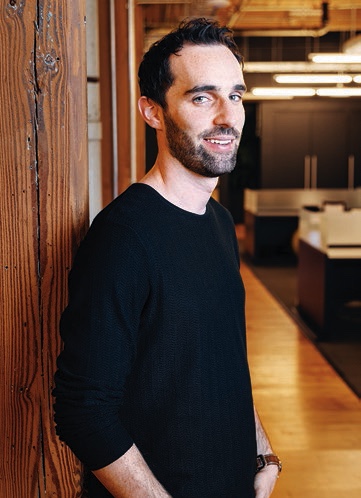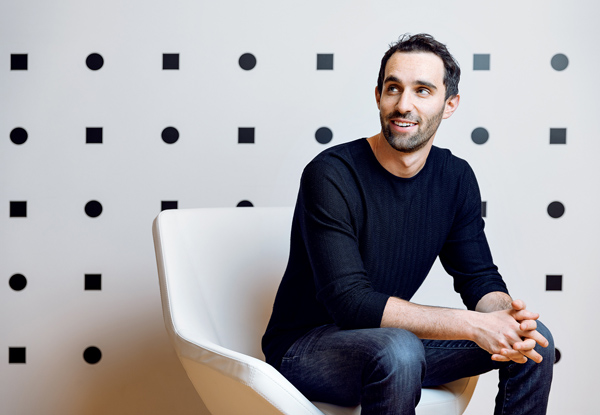Eric Richmond didn’t know he was walking into a job interview. It was late 2017, and Richmond — then a third-year associate at Blake, Cassels and Graydon LLP — was visiting the offices of Coinsquare, a digital marketplace for blockchain-based cryptocurrencies like bitcoin. He had arranged the meeting so that he could meet with a few people in what he saw as an exciting new industry.
Richmond made a stellar first impression. It was clear that he actually grasped the complicated mechanics — and potential impact — of blockchain technology. “Every brand-name firm has pitched us on why they’re the best blockchain lawyers,” says Cole Diamond, the CEO and chairman of Coinsquare. “But when they come through our office, we have to educate them.”

“We’re effectively creating the new precedents that will be used by other lawyers,” says Eric Richmond.
Diamond had no plans to hire an in-house counsel. But he also never expected to meet a lawyer who understood his industry. Within a few months, he hired Richmond to head up Coinsquare’s legal department. “We still hire external counsel, but all of it is quarterbacked by Eric,” says Diamond. “There’s only one leading blockchain lawyer in Canada, and we have him.”
At 29, Richmond is an exceptionally young vice-president of legal. But he fits right in at Coinsquare’s brick-and-beam office in Toronto’s trendy King West neighbourhood, where the average age falls well below 35 and hoodies, not suits, are de rigueur. “At Blakes, I was the guy who never wore a tie,” says Richmond. “Now, I never have to put on a suit. It’s great.”
But Richmond joined Coinsquare for the career opportunity, not the dress code. He started to research blockchain in early 2017, as an associate at Blakes, excited by the potentially world-changing technology. Its details are dizzying, but think of it this way: the blockchain is a digital ledger that records transactions. And because it’s hosted on computers across the world, virtually anyone anywhere can view the ledger in real time. This is a big deal. For eons, people have relied on central authorities to facilitate transactions, such as stock trades and house purchases. The blockchain can, theoretically, render major institutions like banks and governments obsolete.
Richmond was hooked on this idea. At Blakes, he started to participate in the firm’s Nitro initiative, which provides $1 million of subsidized legal services each year to startups, including blockchain companies. When senior lawyers met with businesses in the space, they’d invite Richmond to sit in.
But private practice grated on Richmond. “You always needed to be on,” he says. “Even when you worked your ass off to close a massive deal, you’d just wake up the next day and move on to the next one.” When Coinsquare offered him a job, he accepted, fully aware that he was leaving a stable career for a volatile industry, chock full of speculators and get-rich-quick schemes. In his first few months at the company, for instance, he saw the value of bitcoin plummet from more than $25,000 to $10,000. The price now hovers around $4,700. “Was it scary? Yes,” he says. “These things are in the back of my mind, but I think long-term about the space.”
Richmond practises in disparate areas of the law: intellectual property, employment, securities and more. He attends C-level meetings. And he works closely with the chief compliance officer, Felix Mazer, a former RBC capital-markets in-house counsel. “Eric’s about 15 years younger than me,” says Mazer. “The first time I met him, I thought, This is your general counsel? But I quickly realized he gets it.”
According to both Mazer and Diamond, Richmond works more hours than anyone else in the company (“always with a smile,” Mazer adds), and he can turn techno-babble into plain English and then into legalese. “External counsel often expect me to be the one who knows all the stuff,” says Mazer. “But I tell them it’s actually Eric who knows everything.”
Most of Richmond’s work involves leaving the old world behind. There is no clear regulatory framework that governs the cryptocurrency market. “We’re effectively creating the new precedents that will be used by other lawyers,” says Richmond. “We’re trailblazing.”

Timeline of a blockchain lawyer
2008: Richmond begins an undergraduate degree in business at Huron University College.
2010: Two years later, he continues his studies at Western University, enrolling in the JD HBA program.
2011: Richmond co-founds UniversityBuy.com, a Groupon competitor tailored to post secondary students. “We were profitable,” he says. “But we saw Groupon struggling, so we pulled the plug.”
2012: As a part of his business program, Richmond solicits an eight-month consulting gig with the Tampa Bay Lightning. He helps the hockey team use data analytics to measure passing statistics.
2014: Richmond graduates from Western University and articles at Blake, Cassels and Graydon LLP.
2015: After Richmond is called to the Ontario bar, he joins Blakes as an associate.
2017: Richmond, as part of the firm’s Nitro program, offers subsidized legal services to emerging technology companies in the Toronto-Waterloo corridor.
2018: Richmond has a big year. He joins Coinsquare as its first in-house counsel. Then, he marries his partner, Lisa Pincus, an associate in the corporate group at Osler, Hoskin & Harcourt LLP.
This story is from our Spring 2019 Issue.
Photography by Jennifer Roberts


